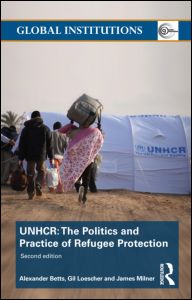Reading about recent cases in the international criminal court, I realized that I don't actually know much about how the court really functions. So I went looking for a primer on the ICC and found something in the "Global Institutions Series" published by Routledge (and subsequently remembered that I wanted to blog this series a while back).
 I discovered this series when I went looking for background reading on how the UNHCR functions. I found this book by Loescher et al (pictured), which gave a comprehensive background of the institution in a concise 130 pages (useful for us busy folk). On the inside flap is a list of other volumes that have been assembled, covering institutions from the WHO and the IMF to the International Olympic Committee (see the complete list here). They seem like an imminently practical resource and I've ordered a few more. I may even end up using some in future classes. (FE readers might be interested in the volume on global environmental institutions, which I found in a free online PDF here). The series began in 2005, so some of the volumes might be missing the most recent debates. But for the historical context of these institutions, many of which formed around mid-century (last century), I don't think that should matter much.
I discovered this series when I went looking for background reading on how the UNHCR functions. I found this book by Loescher et al (pictured), which gave a comprehensive background of the institution in a concise 130 pages (useful for us busy folk). On the inside flap is a list of other volumes that have been assembled, covering institutions from the WHO and the IMF to the International Olympic Committee (see the complete list here). They seem like an imminently practical resource and I've ordered a few more. I may even end up using some in future classes. (FE readers might be interested in the volume on global environmental institutions, which I found in a free online PDF here). The series began in 2005, so some of the volumes might be missing the most recent debates. But for the historical context of these institutions, many of which formed around mid-century (last century), I don't think that should matter much.
This is the publisher's summary of the series:
The "Global Institutions Series" is edited by Thomas G. Weiss (The CUNY Graduate Center, New York, USA) and Rorden Wilkinson (University of Manchester, UK) and designed to provide readers with comprehensive, accessible, and informative guides to the history, structure, and activities of key international organizations as well as books that deal with topics of key importance in contemporary global governance. Every volume stands on its own as a thorough and insightful treatment of a particular topic, but the series as a whole contributes to a coherent and complementary portrait of the phenomenon of global institutions at the dawn of the millennium.
Books are written by recognized experts, conform to a similar structure, and cover a range of themes and debates common to the series. These areas of shared concern include the general purpose and rationale for organizations, developments over time, membership, structure, decision-making procedures, and key functions. Moreover, current debates are placed in historical perspective alongside informed analysis and critique. Each book also contains an annotated bibliography and guide to electronic information as well as any annexes appropriate to the subject matter at hand.
No comments:
Post a Comment